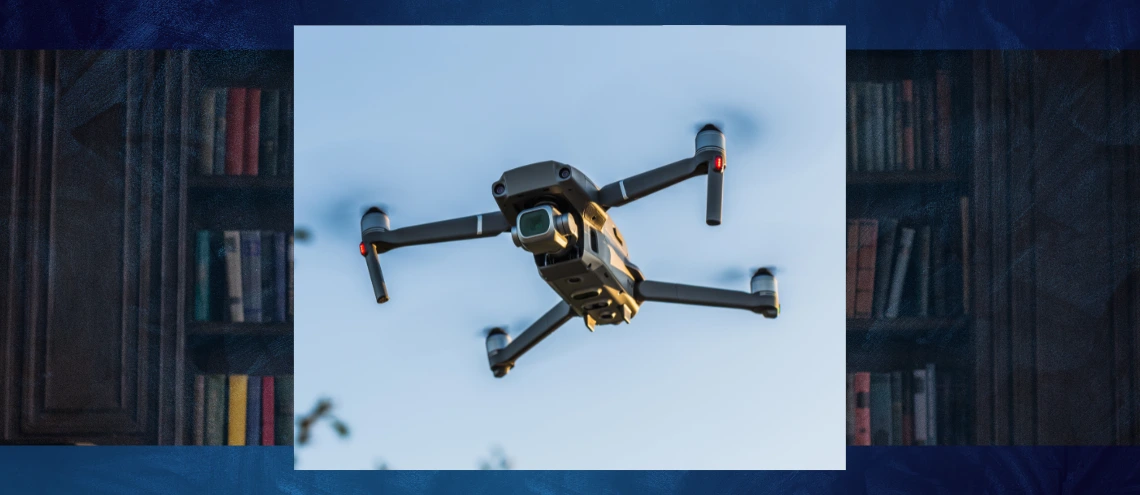
Drones, also known as Unmanned Aircraft Systems (UAS), are in the news over the last few weeks with swarms of them apparently showing up over the skies of New Jersey.
They are used for recreational, commercial, and governmental purposes. However, as their usage has grown, so has concern grown about drones flying over private property. If you actually see a drone hovering near your home or business, your immediate instinct might be to take matters into your own hands and shoot it down.
Bad idea for a variety of reasons, including serious legal consequences.
Here we explore why shooting down a drone is illegal, the federal laws involved, the Texas laws involved, and what you can do instead if you feel a drone is invading your privacy.
Shooting Down a Drone Violates Federal Law
Yes. Under federal law, drones are considered “aircraft.” This classification places drones under the authority of the Federal Aviation Administration (FAA).
According to 18 U.S.C. § 32, dealing with aircraft sabotage, it is illegal to willfully damage, destroy, or disable any aircraft.
This federal statute applies to all aircraft, including drones, regardless of their size or purpose. No federal laws have been specifically written for them, so they are considered an aircraft. Shooting down a drone is a violation of this law and can result in severe criminal penalties, including fines and imprisonment. Although in Texas, you do have privacy rights with drones over your property, see Texas Privacy Act below.
If You Are Arrested for Shooting Down a Drone Additional Charges May Apply
- Discharging a firearm: Shooting into the air, even on your property, may violate local and state laws regarding discharging a weapon within city limits.
- Endangering others: Firing a weapon poses risks to people, property, or pets nearby, leading to charges such as reckless endangerment or property damage
In short, shooting a drone is not only illegal under federal law but can also land you in legal trouble locally.
Drones Are Protected Under FAA Regulations
The FAA regulates the airspace above your property, you don’t. With the FAA in control this means you do not own the airspace over your home or land beyond a certain height.
They are allowed to operate in what is considered “navigable airspace”, as long as they comply with FAA rules.
Commercial drone pilots must follow FAA regulations under Part 107, which include maintaining safe distances from people and property.
Recreational drone pilots must adhere to community guidelines and FAA safety rules.
If a drone is operating legally, shooting it down is an unjustifiable and illegal act, even if it feels like an invasion of your privacy.
What Are The Consequences of Destroying Someone’s Drone?
Beyond federal penalties, shooting down a drone could open you up to civil liability. Drones, especially high-end models, can cost thousands of dollars.
If you shoot down a drone, you may be held responsible for:
- Property damage: The drone owner could file a civil lawsuit and sue you for the cost of repairs or replacement.
- Personal injury claims: If the drone falls (or is hit and disintigrated with stuff falling out of the sky) and injures someone due to your actions, you could face additional legal and financial consequences.
- Legal fees: Hiring an attorney to defend yourself against criminal or civil lawsuits can be costly.
In short, destroying someone’s property, even if it’s a drone, can have serious financial and legal repercussions.
What Can I Do If a Drone Is Invading My Privacy
If you feel a drone is improperly or illegally invading your privacy, do not take matters into your own hands.
We suggest you, follow these steps:
- Document the incident: Take pictures or videos of it and note the time and location of the flight.
- Texas State laws: See below as Txas does have laws relating to drones.
- Reach out to the FAA: If the device appears to be flying dangerously or illegally, you can file a complaint with the FAA.
Yes, there are several laws in Texas that regulate drones, including:
Texas Privacy Act: This law, also known as Chapter 423 of the Texas Government Code, regarding “unmanned aircraft” prohibits the capture of images or recordings of private property or individuals without consent. Violations can result in fines of up to $5,000 per image or recording.
No-Fly Provisions: This law prohibits flying them over certain facilities, including correctional facilities, detention facilities, critical infrastructure facilities, and sports venues, at less than 400 feet.
Hunting: It is prohibited to use drones to hunt, capture, or photograph wildlife without a permit.
State parks: Permits are required for flying them in state parks, with exceptions for Lake Whitney (Whitney, TX) and San Angelo, TX parks.
Registration: Drones that weigh 55 lbs or more must be registered with the Federal Aviation Administration’s Unmanned Aircraft System (UAS) registry.
Violating Texas drone laws can result in criminal charges and even civil lawsuits for injuries or accidents. You can check your local government ordinances to see if there are any additional laws.
Just Don’t Do It
While drones can sometimes feel intrusive or concerning, shooting one down is never the right solution. Federal laws classify them as aircraft, and damaging them can lead to severe criminal and civil penalties. Instead of resorting to illegal actions, document the incident, contact local authorities, and follow the proper legal channels to address your concerns.
Taking the law into your own hands can have unintended consequences. Protect yourself, your property, and others by handling drone-related issues responsibly and legally. photograph someone in a place where they have a reasonable expectation of privacy, such as inside your home.
Contact the authorities: Report the incident to local law enforcement. And if you do get arrested, call us for aggressive legal representation.
Related article:
Boston Man Arrested with Violating National Defense Airspace

